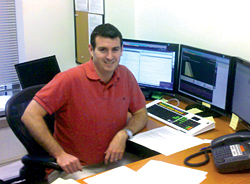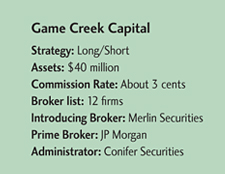Fundamental stock picker Sean Murphy has a philosophy that has served him well over the last decade. "If you’ve got a great idea, make it a real position," Murphy explains.

During the last three years, he’s done that at Boston-based Game Creek Capital, an absolute-return hedge fund. Murphy and longtime money manager Dick Mayo each own a 50 percent stake. Mayo earned his reputation at GMO, the large money manager he started as a founding partner in 1977.
At Game Creek, most assets are Mayo’s. That might change soon. After a three-year incubation period, Game Creek is now seeking outside investors. The selling point, besides Mayo’s imprimatur, is Murphy’s performance. The Boston-area native beat the S&P 500 the last three consecutive years.
His long-short strategy from January 2008 through May of this year has delivered a cumulative return of 75.2 percent and an annualized compounded return of 17.8 percent. That beat the S&P 500’s negative returns of 8.4 percent and negative 2.5 percent, respectively. "We have great insights into these companies," Murphy explained. Due to Mayo’s backing, Game Creek’s strategy benefited from not having to worry about redemptions, when markets were in turmoil. "We had the capital behind us that allowed us to take big swings," he added.
In 2008, Murphy was recruited by Game Creek founder Scott Mayo, Dick Mayo’s son. Murphy joined from Vardon Capital in New York, where he began in 2000, when it was a startup fund. Before he left, it grew to $700 million.

The younger Mayo and Murphy hit it off. They both specialized in media and entertainment companies. They also favored concentrated positions and often "traded around them," Murphy explained. The partnership led to a revamping of the portfolio in August 2008. And that’s when performance began to skyrocket.
Scott Mayo passed away last year, but Murphy remains close to Dick Mayo. Their goal is to protect investors’ capital first, as well as to generate absolute returns when Murphy sees opportunities.
Murphy writes a daily journal in which he analyzes his process and his performance. This helps him better understand stocks and markets. He loosely compares his self-analysis to Boston Red Sox great Ted Williams’ "heat map." Williams created areas within the strike zone that could tell him which pitches yielded the best results. "I’ve found where my happy zone is and where those stocks are that tend to give me an edge," Murphy said.
Murphy invests in liquid large- and mid-cap stocks. Consequently, his strategy is scalable. Still, he admits that it is tough for small hedge funds to attract investors, even if they have an established name. But he is optimistic: "If I can continue to generate strong risk-adjusted returns, capital will follow."



